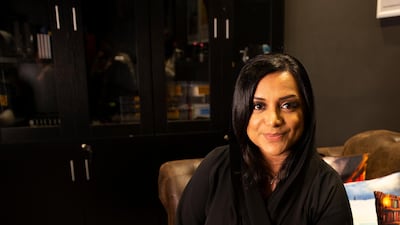Emirati director and producer Nayla Al Khaja made history at Cannes this week as the first Emirati filmmaker ever to have a project accepted by the festival’s prestigious Producers’ Network.
Al Khaja's screenplay for Animal, the feature-length version of her own 2016 short of the same name, beat competition from thousands of other entrants to become one of 500 entries submitted to the network, which for 15 years has linked filmmakers from around the world with the biggest names in production and funding. Al Khaja says: "Animal is my passion project, and I'm really proud that the feature script is the only Emirati script at Producers' Network at Cannes.
“It’s a really proud moment for me as a director/producer to be there representing my country. It’s very prestigious; thousands of producers apply and only 500 are accepted. I’ll be meeting sales agents, distributors, film funds, it’s all very new to me, but I’m ready to work with the heavyweights of the film industry.”
The role of Saudi cinema
Al Khaja says she is not just seeking to bring Animal to the big screen but she is also working on gathering funding for up to a four-film slate, including a horror focusing on exorcism in Islam and a Saudi-set comedy, Hunting for a Husband, about an ambitious young woman who is hoping to find a partner who will enable her to leave the country and study film.
Saudi, which recently legalised cinemas and expressed its intention to build a new industry around film production, seems high on Al Khaja’s list of priorities, and she admits she will be one of the many producers heading to meetings at the inaugural Saudi Pavilion at Cannes’ Film Market while at the event.

“The Saudi news is massive for the whole industry,” Al Khaja tells us. “Now if I make a film for a million dollars, I’m looking at 30 million more audience members, and 600 more cinemas. It’s huge news.”
The filmmaker adds that she has already made her Saudi cinema debut – a short clip she filmed to greet Saudi audiences and introduce herself has already screened at the kingdom’s first Vox cinema in Riyadh, and she clearly doesn’t intend this to be a one-off.
“KSA has opened massive doors in the industry, and it would be insane not to move fast to cater to that gap in the market and make films that are not only commercially viable but also culturally relevant,” she says.
Refocusing on her goals
Back home in Dubai, Al Khaja also found time to launch her new company, Nayla Al Khaja Films, with an opening event just hours before she boarded the plane to France. For many years, Al Khaja ran the production house D7, which made corporate and commercial films, while also serving as a vehicle for her own projects.
Al Khaja says the new company isn’t so much a fresh start as a refocusing of her aims. “I spent 20 years building a production house, and this is the second stage where I don’t want to do commercials. I want to just focus on feature films so this is a creative space for Nayla Al Khaja Films, which will only be feature films,” she says.
“Even if it takes me a year to raise money I’ll do that, because when I was doing the commercial productions it totally took my attention away from the feature films. That’s what’s important to me right now.” Al Khaja admits that her two decades in the industry have not been easy – after numerous promising moments she has still yet to successfully bring a feature film to the screen, despite numerous award-winning short films to her name, and she is committed to focusing solely on this task for the foreseeable future, whatever challenges may come her way.
________________
Read more:
17 looks that show how Middle Eastern designers are ruling the Cannes red carpet
Cannes: Saudi Arabia announces big rebates for film production
Cannes: Annemarie Jacir's Wajib wins big at Arab Cinema Centre awards
________________
“I’ve been doing this for 18 years now, and working in Dubai is not an easy task,” she says. “Filmmaking is one of hardest areas to work in as a creative. The infrastructure is getting better but challenges are still there and, as an Emirati woman, I come with my own unique set of challenges – stereotypes: ‘She’s local, can she direct?’ ‘She’s female can she direct?’
“It’s a massive challenge to get out of the box and do something daring. A lot of Emirati cinema makers really do push to make their work compete to international standards and to get their work seen.”
With uncertainty surrounding the future of the Dubai International Film Festival, those opportunities to have work seen could be about to become even more limited. Al Khaja’s move to focus on a more commercial approach to her films seems to make a lot of sense.
When we caught up with her in Cannes, she sounded very positive about her chances of success in raising her “very detailed” film fund. She wasn’t giving too much away ahead of contracts being signed and partners confirmed, but she did tell us to expect an official announcement soon, so watch this space for more news.

